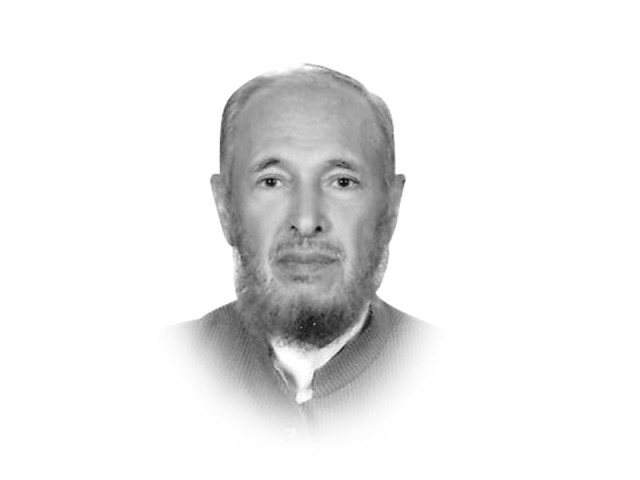Afghan refugees suffering for no fault of theirs
The alleged ‘undocumented refugees’ are the ones the govt institutions failed to reach and register

The writer has served as ambassador to Afghanistan and is a former interior secretary. The views expressed are his own
In a bizarre move bordering on being irresponsible, some people in the government have begun blaming Afghan refugees for being the cause of the prevailing insecurity in the country. Not a day passes when anti-refugee rhetoric, at its vilest, is not aired on talk shows and in the print media. It is seldom realised what damage is being caused to the national interests by this unwarranted and sweeping condemnation of refugees, as if most of Pakistan’s security issues are linked to their presence.
The brouhaha is coming from different directions and it is spreading. It is premised on faulty information, wholly incorrect statistics and preposterous misperceptions.
It is asserted that Afghan refugees have been a cause of insecurity and organised crime in this country. Nothing could be further from truth. Those who were involved in the Public school attack, or Charsadda University, were not refugees. They had planned and carried out the attacks in Afghanistan but had no connection with refugees living in Pakistan. To blame the two incidents on Afghan refugees is unfair and silly.
All of the refugees in Khyber-Pakhtunkhwa (K-P) are earning their own livelihood and are not dependent on any help or charity from the government. They have, on the other hand, made a notable contribution to the area and its economy. They work on the farms and in the construction and transport sectors. In addition, large numbers of them are daily wage earners as hawkers, street peddlers and so on.
There is the unfounded claim of ‘undocumented’ Afghan Refugees . Who are these undocumented refugees? The ones that the government institutions failed to reach and register. Are they to blame for our inability to register them? A person having lived in this country for over 35 years with no criminal record, while selling his merchandise on a street, is ordered to produce ‘documents’. Upon his inability to show any valid documents he is promptly whisked off to Torkham and thrown across the border. His family members are left to moan the departure of their sole bread earner. What hypocrisy!
Under international law no refugee can be forcibly repatriated to his home country. Pakistan is in breach of this law — every day. What message are we sending across to Afghanistan ?
Islamabad talks of brotherly relations and the deep, enduring ties that eternally bind the two countries together. But that is rhetoric that does not relate to ground realities.
Most importantly, the communities where the refugees are settled have never, in the last 40 years, protested or complained about the settlement of refugees in their areas and villages . Refugees and locals have coexisted peacefully for decades. That has been the most relevant factor in the stay of refugees on Pakistani soil.
But the voices of ‘enough is enough’ are not emanating from the local communities hosting the refugees, but from quarters that have little to do with refugee settlements. This is bizarre.
The numbers are exaggerated to fit into the ‘scare and fear’ syndrome, being manufactured by vested interests. The claim that there are about 1 million unregistered refugees in K-P alone, is absurd. In the whole country, the number of the unregistered refugees is not more than one million — perhaps between 5 lakhs and a million.
The parting kicks are remembered and live in memory. Having problems with India and now also Iran, is a heavy load. Let us try to evolve some working relations with Afghanistan before it is too late. Remember, too much is at stake: CASA 1000, TAPI, a long border, joint rivers, Central Asia, hydel power projects on the Kunar river and so on. We must learn to project into the future before taking the plunge. And consider the humanitarian dimension of the problem.
Is it fair to put deadlines on the return of refugees when their homes and villages have been decimated; when there is insecurity and a raging insurgency in areas of their origin; when facilities like schools, hospitals and electricity are not there and job opportunities don’t exist; when 40 per cent of the people are unemployed and when more than two hundred thousand Afghans left the country in 2015, because of poverty and insecurity — many of them drowning in the sea.
Policymakers are supposed to be cognisant of the objective realities, on the one hand, and conscious of the long-term implications of their decisions on the other. Besides, they have to be mindful of the dictates of justice and of the humanitarian obligations.
Afghan refugees would return once conditions are suitable. Until then, no policy decision should be taken which is either unfair, unethical, difficult to implement or sustain and one which could further help destroy the little remaining goodwill for Pakistan. And no step must be taken which causes suffering, pain or injury to a peaceful refugee population and one which violates the international law.
Published in The Express Tribune, July 18th, 2016.
Like Opinion & Editorial on Facebook, follow @ETOpEd on Twitter to receive all updates on all our daily pieces.














COMMENTS
Comments are moderated and generally will be posted if they are on-topic and not abusive.
For more information, please see our Comments FAQ